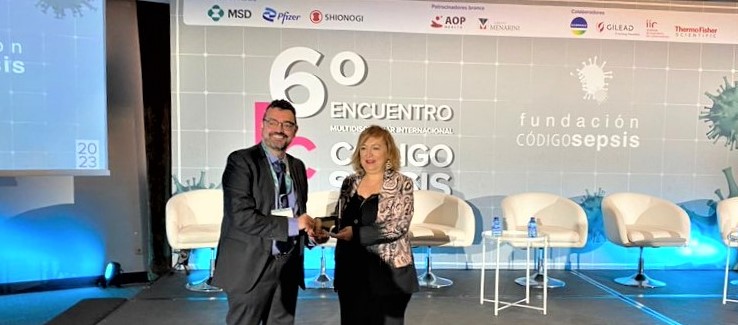Tuesday, 14 March 2023
Prof. Laura Lechuga receives a Código Sepsis Award in recognition of her career and important contributions to diagnostics
The jury recognised the enormous relevance of the research led by Prof. Lechuga, in particular in developing new diagnostic methods, and her commitment to promoting technology transfer.

The awarding ceremony of the 4th edition of the Código Sepsis Prizes was held on March 14 in Madrid, within the framework of the 6th Multidisciplinary and International Sepsis Code Meeting. Prof. Laura M. Lechuga Gómes, CSIC research professor and leader of the ICN2 NanoBiosensors and Bioanalytical Applications Group, is one of the three recipients of this award, established by the Fundación Código Sepsis.
This honour was conferred to Prof. Lechuga in recognition of her outstanding career in scientific research, specifically for her innovative contributions to diagnostic methods through pioneering projects, such as the development of "lab-on-a-chip" type platforms. The jury highlighted the comprehensive nature of her career, which combines high-quality scientific activity with technology transfer, not only in the development of patents but also in terms of promoting the creation of spin-off companies. In addition, they stressed the importance of the international projects coordinated by Prof. Lechuga and the impact of her work on the early diagnosis of diseases, especially the infectious ones. “The Sepsis Code Foundation considers this award to be a humble recognition of the enormous relevance of all the research work of Prof. Lechuga,” which is reflected in more than 250 published research papers, 8 patent families at national and international level, and participation in more than 300 invited conferences around the world.
The Sepsis Code Awards are an initiative of the Fundación Código Sepsis, a multidisciplinary scientific foundation dedicated to improving the approach and prognosis of patients with sepsis. The Fundación Código Sepsis was created in November 2012 with the aim of changing the management of sepsis by joining forces and developing coordinated actions. It is working to standardise early detection, to promote therapeutic measures and monitor patient response to them.

